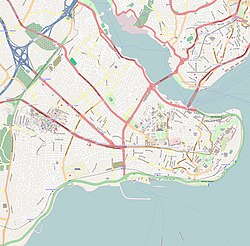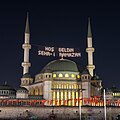| Taksim Mosque | |
|---|---|
Taksim Camii | |
 Taksim Mosque in May 2021 | |
| Religion | |
| Affiliation | Islam |
| Location | |
| Location | Taksim Square, Beyoğlu, Istanbul |
| Geographic coordinates | 41°02′13″N28°59′02″E / 41.037°N 28.984°E |
| Architecture | |
| Architect(s) | Şefik Birkiye, Selim Dalaman |
| Style | Neo-Art Deco [1] |
| Completed | 28 May 2021 |
| Specifications | |
| Capacity | 3,000 people indoors, 4,000 in total [2] |
| Length | 20.70 m (67.9 ft) (building height above the ground) [3] |
| Dome height (outer) | 33 m (108 ft) [2] |
| Dome height (inner) | 9.6 m (31 ft) [4] |
| Dome dia. (outer) | 28 m (92 ft) [5] |
| Minaret(s) | 2 |
| Minaret height | 64.8 m (213 ft) [2] |
Taksim Mosque (Turkish : Taksim Camii) is a mosque complex in Taksim Square, Istanbul. It was designed by two Turkish architects in the Art Deco style, [6] [7] [8] and can hold up to 3,000 worshippers at the same time. Construction began on February 17, 2017, and lasted for four years. [9] The mosque was inaugurated with a Friday prayer attended by the President, Recep Tayyip Erdoğan, on 28 May 2021. [10]
Contents
The land on which the mosque was built is currently owned by the Directorate General of Foundations. [11] [9]






